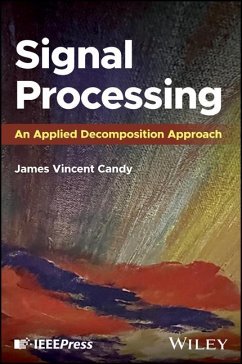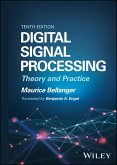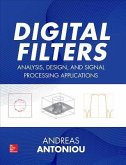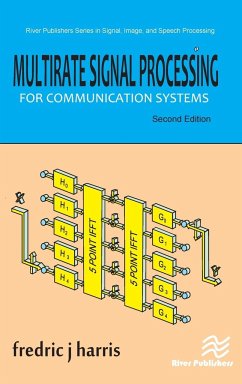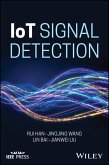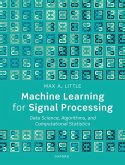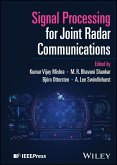James Vincent Candy (Santa Barbara University of California, Unive
Signal Processing
An Applied Decomposition Approach
James Vincent Candy (Santa Barbara University of California, Unive
Signal Processing
An Applied Decomposition Approach
- Gebundenes Buch
- Merkliste
- Auf die Merkliste
- Bewerten Bewerten
- Teilen
- Produkt teilen
- Produkterinnerung
- Produkterinnerung
Separate signals from noise with this valuable introduction to signal processing by applied decomposition The decomposition of complex signals into the sub-signals, or individual components, is a crucial tool in signal processing. It allows each component of a signal to be analyzed individually, enables the signal to be isolated from noise, and processed in full. Decomposition processes have not always been widely adopted due to the difficult underlying mathematics and complex applications. This text simplifies these obstacles. Signal Processing: An Applied Decomposition Approach demystifies…mehr
Andere Kunden interessierten sich auch für
![Digital Signal Processing Digital Signal Processing]() Maurice Bellanger (CNAM, Paris, France)Digital Signal Processing137,99 €
Maurice Bellanger (CNAM, Paris, France)Digital Signal Processing137,99 €![Digital Filters: Analysis, Design, and Signal Processing Applications Digital Filters: Analysis, Design, and Signal Processing Applications]() Andreas AntoniouDigital Filters: Analysis, Design, and Signal Processing Applications139,99 €
Andreas AntoniouDigital Filters: Analysis, Design, and Signal Processing Applications139,99 €![Smart Antennas and Electromagnetic Signal Processing in Advanced Wireless Technology Smart Antennas and Electromagnetic Signal Processing in Advanced Wireless Technology]() Paul RP Hoole (UK Wessex Institute of Technology)Smart Antennas and Electromagnetic Signal Processing in Advanced Wireless Technology117,99 €
Paul RP Hoole (UK Wessex Institute of Technology)Smart Antennas and Electromagnetic Signal Processing in Advanced Wireless Technology117,99 €![Multirate Signal Processing for Communication Systems, Second Edition Multirate Signal Processing for Communication Systems, Second Edition]() Fredric J. HarrisMultirate Signal Processing for Communication Systems, Second Edition134,99 €
Fredric J. HarrisMultirate Signal Processing for Communication Systems, Second Edition134,99 €![Iot Signal Detection Iot Signal Detection]() Rui Han (School of Cyber Science and Beihang University TechnologyIot Signal Detection123,99 €
Rui Han (School of Cyber Science and Beihang University TechnologyIot Signal Detection123,99 €![Machine Learning for Signal Processing Machine Learning for Signal Processing]() Prof Max A. Little (Professor of Mathematics, Aston University, ProMachine Learning for Signal Processing48,99 €
Prof Max A. Little (Professor of Mathematics, Aston University, ProMachine Learning for Signal Processing48,99 €![Signal Processing for Joint Radar Communications Signal Processing for Joint Radar Communications]() Signal Processing for Joint Radar Communications140,99 €
Signal Processing for Joint Radar Communications140,99 €-
-
-
Separate signals from noise with this valuable introduction to signal processing by applied decomposition The decomposition of complex signals into the sub-signals, or individual components, is a crucial tool in signal processing. It allows each component of a signal to be analyzed individually, enables the signal to be isolated from noise, and processed in full. Decomposition processes have not always been widely adopted due to the difficult underlying mathematics and complex applications. This text simplifies these obstacles. Signal Processing: An Applied Decomposition Approach demystifies these tools from a model-based perspective. This offers a mathematically informed, "step-by-step" analysis of the process by breaking down a composite signal/system into its constituent parts, while introducing both fundamental concepts and advanced applications. This comprehensive approach addresses each of the major decomposition techniques, making it an indispensable addition to any library specializing in signal processing. Signal Processing readers will find: * Signal decomposition techniques developed from the data-based, spectral-based and model-based perspectives incorporate: statistical approaches (PCA, ICA, Singular Spectrum); spectral approaches (MTM, PHD, MUSIC); and model-based approaches (EXP, LATTICE, SSP) * In depth discussion of topics includes signal/system estimation and decomposition, time domain and frequency domain techniques, systems theory, modal decompositions, applications and many more * Numerous figures, examples, and tables illustrating key concepts and algorithms are developed throughout the text * Includes problem sets, case studies, real-world applications as well as MATLAB notes highlighting applicable commands Signal Processing is ideal for engineering and scientific professionals, as well as graduate students seeking a focused text on signal/system decomposition with performance metrics and real-world applications.
Produktdetails
- Produktdetails
- Verlag: John Wiley & Sons Inc
- Seitenzahl: 480
- Erscheinungstermin: 29. Oktober 2024
- Englisch
- Abmessung: 231mm x 153mm x 30mm
- Gewicht: 792g
- ISBN-13: 9781394207442
- ISBN-10: 1394207441
- Artikelnr.: 70371031
- Herstellerkennzeichnung
- Libri GmbH
- Europaallee 1
- 36244 Bad Hersfeld
- gpsr@libri.de
- Verlag: John Wiley & Sons Inc
- Seitenzahl: 480
- Erscheinungstermin: 29. Oktober 2024
- Englisch
- Abmessung: 231mm x 153mm x 30mm
- Gewicht: 792g
- ISBN-13: 9781394207442
- ISBN-10: 1394207441
- Artikelnr.: 70371031
- Herstellerkennzeichnung
- Libri GmbH
- Europaallee 1
- 36244 Bad Hersfeld
- gpsr@libri.de
James Vincent Candy, PhD, is the Chief Scientist for Engineering, a Distinguished Member of the Technical Staff, founder and former Director of the Center for Advanced Signal & Image Sciences (CASIS) at the Lawrence Livermore National Laboratory and an Adjunct Full-Professor at the University of California, Santa Barbara. He received his his BSEE from the University of Cincinnati along with his MSE and PhD in Electrical Engineering from the University of Florida. Dr. Candy is a Life-Fellow of the IEEE and a 25-Year-Fellow of the Acoustical Society of America (ASA). He was elected as a Life Member at the University of Cambridge (Clare Hall College). Dr. Candy has been awarded the Interdisciplinary Helmholtz-Rayleigh Silver Medal in Signal Processing/Underwater Acoustics by the Acoustical Society of America, the IEEE Distinguished Technical Achievement Award for the development of model-based signal processing as well as an elected IEEE Distinguished Lecturer in Oceanic Signal Processing. He also received the R&D100 award for his innovative invention in radiation threat detection. He has published over 250 journal articles, book chapters, and technical reports as well as written six texts in signal processing: Signal Processing: the Model-Based Approach, (McGraw-Hill, 1986), Signal Processing: the Modern Approach,(McGraw-Hill, 1988), Model-Based Signal Processing, (Wiley/IEEE Press, 2006), Bayesian Signal Processing: Classical, Modern and Particle Filtering (Wiley/IEEE Press, 2009), Bayesian Signal Processing: Classical, Modern and Particle Filtering, 2nd Ed. (Wiley/IEEE Press, 2016), and Model-Based Processing: An Applied Subspace Identification Approach (Wiley, 2019).
About the Author xiii
Preface xv
Acknowledgments xxv
Glossary xxvi
About the Companion Website xxx
1 Introduction 1
1.1 Background 1
1.2 Spectral Decomposition 4
1.3 Data Decomposition 6
1.4 Model-based Decomposition 13
1.5 Notation and Terminology 24
1.6 Summary 25
MATLAB® Notes 26
References 26
Problems 27
2 Random Signals and Systems 31
2.1 Introduction 31
2.2 Discrete Random Signals 34
2.3 Spectral Representation of Random Signals 38
2.4 Discrete Systems with Random Inputs 41
2.5 Classical Spectral Estimation 44
2.5.1 Correlation Method (Blackman-Tukey) 45
2.5.2 Average Periodogram Method (Welch) 46
2.5.3 Minimum Variance Distortionless Response (MVDR) 48
2.5.4 Coherence Function 50
2.6 Case Study: Sinusoids in Noise 52
2.7 Summary 54
MATLAB® Notes 55
References 55
Problems 56
3 Signal Models 61
3.1 Data-Based Models 61
3.1.1 Data-Based Response Matrices 61
3.1.2 Data-Based Toeplitz Matrices 63
3.1.3 Data-Based Hankel Matrices 64
3.2 Parametric-Based Models 65
3.2.1 ARMAX (AR, ARX, MA, ARMA) Models 65
3.2.2 Lattice Models 73
3.2.3 Transfer Function/Frequency Response Function Models 78
3.2.4 Harmonic Models 81
3.3 State-space Models 85
3.3.1 Continuous-time State-space Models 86
3.3.2 Sampled-data State-space Models 88
3.3.3 Discrete-time State-space Models 90
3.3.4 Gauss-Markov State-space Models 92
3.3.5 Innovations Model 95
3.3.6 State-space Equivalence Models 96
3.4 Summary 103
MATLAB® Notes 103
References 104
Problems 105
4 Signal Estimation 111
4.1 Classical Estimation 111
4.1.1 Estimator Properties 113
4.1.2 Estimator Performance 115
4.2 Minimum Variance (MV) Estimation 116
4.3 Maximum A-Posteriori (MAP) Estimation 119
4.4 Maximum Likelihood (ML) Estimation 121
4.5 Least-squares (LS) Estimation 124
4.5.1 Batch Least Squares 124
4.5.2 Recursive Least-squares 128
4.6 Optimal Signal Estimation 133
4.7 Projection Theory 137
4.7.1 Orthogonal Projections: A Geometric Decomposition Perspective 137
4.7.2 Orthogonal Projections: Singular Value Decomposition 140
4.8 Summary 142
MATLAB® Notes 142
References 143
Problems 144
5 Signal Decomposition 149
5.1 Introduction 149
5.2 Data-Based Decompositions 149
5.2.1 Data Decomposition: Principal Component Analysis (PCA) 151
5.2.2 Data Decomposition: Independent Component Analysis (ICA) 156
5.2.2.1 Higher Order Statistics 159
5.2.2.2 Information Theory: Negentropy 160
5.2.2.3 Information Theory: Mutual Information 161
5.2.2.4 Estimation Theory: Maximum Likelihood 162
5.2.3 Data Decomposition: Singular Spectral Analysis (SSA) 164
5.3 Spectral-Based Decompositions 168
5.3.1 Spectral Decomposition: Multitaper Method (MTM) 168
5.3.2 Spectral Decomposition: Subspace Method 173
5.3.3 Spectral Decomposition: Pisarenko Harmonic Decomposition (PHD) Method
176
5.3.4 Spectral Decomposition: Multiple Signal Classification (MUSIC) Method
177
5.4 Model-Based Decomposition 179
5.4.1 Model-Based Decomposition: Damped Exponential Method 180
5.4.2 Model-Based Decomposition: Lattice Method 186
5.4.3 Model-Based Decomposition: State-Space Method 192
5.5 Case Study: Harmonics in Noise 198
5.6 Summary 201
MATLAB® Notes 201
References 202
Problems 206
6 Model-based Decomposition: Time Domain 211
6.1 Background: State-space Systems 211
6.1.1 Discrete Systems Theory 212
6.1.2 Stable Linear Systems 214
6.1.3 Equivalent Linear Systems 215
6.1.4 Modal Systems 216
6.2 Realization Problem 220
6.2.1 Realization Theory 221
6.2.2 Balanced Realizations 226
6.2.3 Systems Theory Summary 227
6.3 Realization Decomposition 228
6.3.1 Ho-Kalman Realization 228
6.3.2 SVD Realization 230
6.4 Subspace Decomposition: Orthogonal Projections 233
6.4.1 Subspace Realization: Orthogonal Projections 236
6.4.2 Multivariable Output Error State-space (MOESP) Algorithm 241
6.5 Subspace Decomposition: Oblique Projections 244
6.5.1 Subspace Realization: Oblique Projections 248
6.5.2 Numerical Algorithms for Subspace State-space System Identification
(N4SID) 250
6.6 System Order Estimation and Validation 253
6.6.1 Order Estimation: SVD Approach 255
6.6.2 Model Validation 257
6.7 Case Study: Multichannel Mechanical Systems 259
6.7.1 Mechanical Systems 260
6.7.2 Case Study: 3-mass Mechanical System 261
6.8 Summary 267
MATLAB® Notes 268
References 268
Problems 270
7 Model-Based Decomposition: Frequency Domain 279
7.1 Introduction 279
7.1.1 Background 280
7.2 Frequency Response Functions (FRF) 282
7.2.1 FRF Estimation: Impulse Response Method 283
7.2.2 FRF Spectral Estimation: Polynomial Models 285
7.2.3 FRF-Spectral Estimation: Power Spectra 286
7.2.4 FRF-Spectral Estimation: Frequency Domain Decomposition (FDD) Method
289
7.2.4.1 Power Spectral Density Decomposition 289
7.2.4.2 Complex Mode Indicator Function (CMIF) 290
7.2.5 Stabilization Diagram (SDIAG) 292
7.3 Least-squares Complex Frequency (LSCF) Method 295
7.4 PolyReference Least-Squares Complex Frequency (pLSCF) Method 301
7.5 Maximum Likelihood PolyReference Frequency Domain Estimation (ML-pLSCF)
307
7.6 Case Study: 15-DOF Structure 312
7.7 Summary 320
MATLAB® Notes 322
References 322
Problems 324
8 Performance Analysis 329
8.1 Statistical Performance Methods 329
8.1.1 Zero-Mean Test 329
8.1.2 Whiteness Test 330
8.1.3 Weighted Sum-Squared Residual Test 331
8.1.4 Standard Error Test 332
8.1.5 Correlation Coefficient Function Test 332
8.1.6 Coherence Function Test 333
8.1.7 Ensemble Tests 334
8.1.8 Statistical Order Estimation 335
8.1.9 Signal (Model) Validation 340
8.1.10 MAD Signal Validation 341
8.2 Physical Performance Metrics 344
8.2.1 Spectral Peaks: Picking/Histogram 346
8.2.2 Modal Assurance Criterion (MAC) 347
8.2.3 Hankel/SVD Criteria 348
8.2.4 Modal Observability Correlation (MOC) Criterion 349
8.2.5 Modal Singular Value (MSV) Criterion 349
8.2.6 Stabilization Diagram (SDIAG) 350
8.2.7 Modal Frequency Tracker 351
8.3 Case Study: Resonant Modal MCK System 352
8.4 Summary 355
MATLAB® Notes 355
References 355
9 Applications 359
9.1 Modal Decomposition: Sounding Rocket Flight 359
9.1.1 Experimental Test Unit Design and Analysis 359
9.1.2 Sounding Rocket Flight Testing 360
9.1.3 Summary 367
9.2 Vibrational Response of a Cylindrical Structure: Identification and
Modal Tracking 370
9.2.1 Summary 376
9.3 Resonant Ultrasound Spectroscopy 377
9.3.1 RUS Methodology 379
9.3.2 Modal Analysis: FRF and Frequency Histogram 380
9.3.3 Model-Based Decomposition Approach 382
9.3.4 Application: Parallel Piped Structure 382
9.3.4.1 Synthesized Data: RPP Structure 383
9.3.5 Experimental Data: RPP Structure 385
9.3.6 Model-Based Decomposition Processor 388
9.3.7 Elastic Coefficient Estimation 388
9.3.8 Summary 390
9.4 Model-Based Subsystem Decomposition of an 8-Story (8-Mass) Structure
390
9.4.1 Subspace Structural Identification 391
9.4.2 Shaping Filters 396
9.4.3 Subsystem Modal Extraction 397
9.4.4 Summary 403
9.5 Data-Based Decomposition: Time-Reversal Processing 403
9.5.1 Iterative Time-Reversal Decomposition 406
9.5.2 Eigen-decomposition Time-reversal Extraction 408
9.5.3 Summary 413
References 413
A Probability and Statistics Overview 417
A.1 Probability Theory 417
A.2 Gaussian Random Vectors 422
A.3 Uncorrelated Transformation: Gaussian Random Vectors 423
A.4 Toeplitz Correlation Matrices 424
A.5 Important Processes 424
References 426
B Projection Theory 427
B.1 Projections: Deterministic Spaces 427
B.2 Projections: Random Spaces 428
B.3 Projection: Operators 429
B.3.1 Orthogonal (Perpendicular) Projections 429
B.3.2 Oblique (Parallel) Projections 430
References 432
C Matrix Decompositions 433
C.1 Singular Value Decomposition 433
C.2 QR Decomposition 435
C.3 LQ Decomposition 435
References 436
Index 437
Preface xv
Acknowledgments xxv
Glossary xxvi
About the Companion Website xxx
1 Introduction 1
1.1 Background 1
1.2 Spectral Decomposition 4
1.3 Data Decomposition 6
1.4 Model-based Decomposition 13
1.5 Notation and Terminology 24
1.6 Summary 25
MATLAB® Notes 26
References 26
Problems 27
2 Random Signals and Systems 31
2.1 Introduction 31
2.2 Discrete Random Signals 34
2.3 Spectral Representation of Random Signals 38
2.4 Discrete Systems with Random Inputs 41
2.5 Classical Spectral Estimation 44
2.5.1 Correlation Method (Blackman-Tukey) 45
2.5.2 Average Periodogram Method (Welch) 46
2.5.3 Minimum Variance Distortionless Response (MVDR) 48
2.5.4 Coherence Function 50
2.6 Case Study: Sinusoids in Noise 52
2.7 Summary 54
MATLAB® Notes 55
References 55
Problems 56
3 Signal Models 61
3.1 Data-Based Models 61
3.1.1 Data-Based Response Matrices 61
3.1.2 Data-Based Toeplitz Matrices 63
3.1.3 Data-Based Hankel Matrices 64
3.2 Parametric-Based Models 65
3.2.1 ARMAX (AR, ARX, MA, ARMA) Models 65
3.2.2 Lattice Models 73
3.2.3 Transfer Function/Frequency Response Function Models 78
3.2.4 Harmonic Models 81
3.3 State-space Models 85
3.3.1 Continuous-time State-space Models 86
3.3.2 Sampled-data State-space Models 88
3.3.3 Discrete-time State-space Models 90
3.3.4 Gauss-Markov State-space Models 92
3.3.5 Innovations Model 95
3.3.6 State-space Equivalence Models 96
3.4 Summary 103
MATLAB® Notes 103
References 104
Problems 105
4 Signal Estimation 111
4.1 Classical Estimation 111
4.1.1 Estimator Properties 113
4.1.2 Estimator Performance 115
4.2 Minimum Variance (MV) Estimation 116
4.3 Maximum A-Posteriori (MAP) Estimation 119
4.4 Maximum Likelihood (ML) Estimation 121
4.5 Least-squares (LS) Estimation 124
4.5.1 Batch Least Squares 124
4.5.2 Recursive Least-squares 128
4.6 Optimal Signal Estimation 133
4.7 Projection Theory 137
4.7.1 Orthogonal Projections: A Geometric Decomposition Perspective 137
4.7.2 Orthogonal Projections: Singular Value Decomposition 140
4.8 Summary 142
MATLAB® Notes 142
References 143
Problems 144
5 Signal Decomposition 149
5.1 Introduction 149
5.2 Data-Based Decompositions 149
5.2.1 Data Decomposition: Principal Component Analysis (PCA) 151
5.2.2 Data Decomposition: Independent Component Analysis (ICA) 156
5.2.2.1 Higher Order Statistics 159
5.2.2.2 Information Theory: Negentropy 160
5.2.2.3 Information Theory: Mutual Information 161
5.2.2.4 Estimation Theory: Maximum Likelihood 162
5.2.3 Data Decomposition: Singular Spectral Analysis (SSA) 164
5.3 Spectral-Based Decompositions 168
5.3.1 Spectral Decomposition: Multitaper Method (MTM) 168
5.3.2 Spectral Decomposition: Subspace Method 173
5.3.3 Spectral Decomposition: Pisarenko Harmonic Decomposition (PHD) Method
176
5.3.4 Spectral Decomposition: Multiple Signal Classification (MUSIC) Method
177
5.4 Model-Based Decomposition 179
5.4.1 Model-Based Decomposition: Damped Exponential Method 180
5.4.2 Model-Based Decomposition: Lattice Method 186
5.4.3 Model-Based Decomposition: State-Space Method 192
5.5 Case Study: Harmonics in Noise 198
5.6 Summary 201
MATLAB® Notes 201
References 202
Problems 206
6 Model-based Decomposition: Time Domain 211
6.1 Background: State-space Systems 211
6.1.1 Discrete Systems Theory 212
6.1.2 Stable Linear Systems 214
6.1.3 Equivalent Linear Systems 215
6.1.4 Modal Systems 216
6.2 Realization Problem 220
6.2.1 Realization Theory 221
6.2.2 Balanced Realizations 226
6.2.3 Systems Theory Summary 227
6.3 Realization Decomposition 228
6.3.1 Ho-Kalman Realization 228
6.3.2 SVD Realization 230
6.4 Subspace Decomposition: Orthogonal Projections 233
6.4.1 Subspace Realization: Orthogonal Projections 236
6.4.2 Multivariable Output Error State-space (MOESP) Algorithm 241
6.5 Subspace Decomposition: Oblique Projections 244
6.5.1 Subspace Realization: Oblique Projections 248
6.5.2 Numerical Algorithms for Subspace State-space System Identification
(N4SID) 250
6.6 System Order Estimation and Validation 253
6.6.1 Order Estimation: SVD Approach 255
6.6.2 Model Validation 257
6.7 Case Study: Multichannel Mechanical Systems 259
6.7.1 Mechanical Systems 260
6.7.2 Case Study: 3-mass Mechanical System 261
6.8 Summary 267
MATLAB® Notes 268
References 268
Problems 270
7 Model-Based Decomposition: Frequency Domain 279
7.1 Introduction 279
7.1.1 Background 280
7.2 Frequency Response Functions (FRF) 282
7.2.1 FRF Estimation: Impulse Response Method 283
7.2.2 FRF Spectral Estimation: Polynomial Models 285
7.2.3 FRF-Spectral Estimation: Power Spectra 286
7.2.4 FRF-Spectral Estimation: Frequency Domain Decomposition (FDD) Method
289
7.2.4.1 Power Spectral Density Decomposition 289
7.2.4.2 Complex Mode Indicator Function (CMIF) 290
7.2.5 Stabilization Diagram (SDIAG) 292
7.3 Least-squares Complex Frequency (LSCF) Method 295
7.4 PolyReference Least-Squares Complex Frequency (pLSCF) Method 301
7.5 Maximum Likelihood PolyReference Frequency Domain Estimation (ML-pLSCF)
307
7.6 Case Study: 15-DOF Structure 312
7.7 Summary 320
MATLAB® Notes 322
References 322
Problems 324
8 Performance Analysis 329
8.1 Statistical Performance Methods 329
8.1.1 Zero-Mean Test 329
8.1.2 Whiteness Test 330
8.1.3 Weighted Sum-Squared Residual Test 331
8.1.4 Standard Error Test 332
8.1.5 Correlation Coefficient Function Test 332
8.1.6 Coherence Function Test 333
8.1.7 Ensemble Tests 334
8.1.8 Statistical Order Estimation 335
8.1.9 Signal (Model) Validation 340
8.1.10 MAD Signal Validation 341
8.2 Physical Performance Metrics 344
8.2.1 Spectral Peaks: Picking/Histogram 346
8.2.2 Modal Assurance Criterion (MAC) 347
8.2.3 Hankel/SVD Criteria 348
8.2.4 Modal Observability Correlation (MOC) Criterion 349
8.2.5 Modal Singular Value (MSV) Criterion 349
8.2.6 Stabilization Diagram (SDIAG) 350
8.2.7 Modal Frequency Tracker 351
8.3 Case Study: Resonant Modal MCK System 352
8.4 Summary 355
MATLAB® Notes 355
References 355
9 Applications 359
9.1 Modal Decomposition: Sounding Rocket Flight 359
9.1.1 Experimental Test Unit Design and Analysis 359
9.1.2 Sounding Rocket Flight Testing 360
9.1.3 Summary 367
9.2 Vibrational Response of a Cylindrical Structure: Identification and
Modal Tracking 370
9.2.1 Summary 376
9.3 Resonant Ultrasound Spectroscopy 377
9.3.1 RUS Methodology 379
9.3.2 Modal Analysis: FRF and Frequency Histogram 380
9.3.3 Model-Based Decomposition Approach 382
9.3.4 Application: Parallel Piped Structure 382
9.3.4.1 Synthesized Data: RPP Structure 383
9.3.5 Experimental Data: RPP Structure 385
9.3.6 Model-Based Decomposition Processor 388
9.3.7 Elastic Coefficient Estimation 388
9.3.8 Summary 390
9.4 Model-Based Subsystem Decomposition of an 8-Story (8-Mass) Structure
390
9.4.1 Subspace Structural Identification 391
9.4.2 Shaping Filters 396
9.4.3 Subsystem Modal Extraction 397
9.4.4 Summary 403
9.5 Data-Based Decomposition: Time-Reversal Processing 403
9.5.1 Iterative Time-Reversal Decomposition 406
9.5.2 Eigen-decomposition Time-reversal Extraction 408
9.5.3 Summary 413
References 413
A Probability and Statistics Overview 417
A.1 Probability Theory 417
A.2 Gaussian Random Vectors 422
A.3 Uncorrelated Transformation: Gaussian Random Vectors 423
A.4 Toeplitz Correlation Matrices 424
A.5 Important Processes 424
References 426
B Projection Theory 427
B.1 Projections: Deterministic Spaces 427
B.2 Projections: Random Spaces 428
B.3 Projection: Operators 429
B.3.1 Orthogonal (Perpendicular) Projections 429
B.3.2 Oblique (Parallel) Projections 430
References 432
C Matrix Decompositions 433
C.1 Singular Value Decomposition 433
C.2 QR Decomposition 435
C.3 LQ Decomposition 435
References 436
Index 437
About the Author xiii
Preface xv
Acknowledgments xxv
Glossary xxvi
About the Companion Website xxx
1 Introduction 1
1.1 Background 1
1.2 Spectral Decomposition 4
1.3 Data Decomposition 6
1.4 Model-based Decomposition 13
1.5 Notation and Terminology 24
1.6 Summary 25
MATLAB® Notes 26
References 26
Problems 27
2 Random Signals and Systems 31
2.1 Introduction 31
2.2 Discrete Random Signals 34
2.3 Spectral Representation of Random Signals 38
2.4 Discrete Systems with Random Inputs 41
2.5 Classical Spectral Estimation 44
2.5.1 Correlation Method (Blackman-Tukey) 45
2.5.2 Average Periodogram Method (Welch) 46
2.5.3 Minimum Variance Distortionless Response (MVDR) 48
2.5.4 Coherence Function 50
2.6 Case Study: Sinusoids in Noise 52
2.7 Summary 54
MATLAB® Notes 55
References 55
Problems 56
3 Signal Models 61
3.1 Data-Based Models 61
3.1.1 Data-Based Response Matrices 61
3.1.2 Data-Based Toeplitz Matrices 63
3.1.3 Data-Based Hankel Matrices 64
3.2 Parametric-Based Models 65
3.2.1 ARMAX (AR, ARX, MA, ARMA) Models 65
3.2.2 Lattice Models 73
3.2.3 Transfer Function/Frequency Response Function Models 78
3.2.4 Harmonic Models 81
3.3 State-space Models 85
3.3.1 Continuous-time State-space Models 86
3.3.2 Sampled-data State-space Models 88
3.3.3 Discrete-time State-space Models 90
3.3.4 Gauss-Markov State-space Models 92
3.3.5 Innovations Model 95
3.3.6 State-space Equivalence Models 96
3.4 Summary 103
MATLAB® Notes 103
References 104
Problems 105
4 Signal Estimation 111
4.1 Classical Estimation 111
4.1.1 Estimator Properties 113
4.1.2 Estimator Performance 115
4.2 Minimum Variance (MV) Estimation 116
4.3 Maximum A-Posteriori (MAP) Estimation 119
4.4 Maximum Likelihood (ML) Estimation 121
4.5 Least-squares (LS) Estimation 124
4.5.1 Batch Least Squares 124
4.5.2 Recursive Least-squares 128
4.6 Optimal Signal Estimation 133
4.7 Projection Theory 137
4.7.1 Orthogonal Projections: A Geometric Decomposition Perspective 137
4.7.2 Orthogonal Projections: Singular Value Decomposition 140
4.8 Summary 142
MATLAB® Notes 142
References 143
Problems 144
5 Signal Decomposition 149
5.1 Introduction 149
5.2 Data-Based Decompositions 149
5.2.1 Data Decomposition: Principal Component Analysis (PCA) 151
5.2.2 Data Decomposition: Independent Component Analysis (ICA) 156
5.2.2.1 Higher Order Statistics 159
5.2.2.2 Information Theory: Negentropy 160
5.2.2.3 Information Theory: Mutual Information 161
5.2.2.4 Estimation Theory: Maximum Likelihood 162
5.2.3 Data Decomposition: Singular Spectral Analysis (SSA) 164
5.3 Spectral-Based Decompositions 168
5.3.1 Spectral Decomposition: Multitaper Method (MTM) 168
5.3.2 Spectral Decomposition: Subspace Method 173
5.3.3 Spectral Decomposition: Pisarenko Harmonic Decomposition (PHD) Method
176
5.3.4 Spectral Decomposition: Multiple Signal Classification (MUSIC) Method
177
5.4 Model-Based Decomposition 179
5.4.1 Model-Based Decomposition: Damped Exponential Method 180
5.4.2 Model-Based Decomposition: Lattice Method 186
5.4.3 Model-Based Decomposition: State-Space Method 192
5.5 Case Study: Harmonics in Noise 198
5.6 Summary 201
MATLAB® Notes 201
References 202
Problems 206
6 Model-based Decomposition: Time Domain 211
6.1 Background: State-space Systems 211
6.1.1 Discrete Systems Theory 212
6.1.2 Stable Linear Systems 214
6.1.3 Equivalent Linear Systems 215
6.1.4 Modal Systems 216
6.2 Realization Problem 220
6.2.1 Realization Theory 221
6.2.2 Balanced Realizations 226
6.2.3 Systems Theory Summary 227
6.3 Realization Decomposition 228
6.3.1 Ho-Kalman Realization 228
6.3.2 SVD Realization 230
6.4 Subspace Decomposition: Orthogonal Projections 233
6.4.1 Subspace Realization: Orthogonal Projections 236
6.4.2 Multivariable Output Error State-space (MOESP) Algorithm 241
6.5 Subspace Decomposition: Oblique Projections 244
6.5.1 Subspace Realization: Oblique Projections 248
6.5.2 Numerical Algorithms for Subspace State-space System Identification
(N4SID) 250
6.6 System Order Estimation and Validation 253
6.6.1 Order Estimation: SVD Approach 255
6.6.2 Model Validation 257
6.7 Case Study: Multichannel Mechanical Systems 259
6.7.1 Mechanical Systems 260
6.7.2 Case Study: 3-mass Mechanical System 261
6.8 Summary 267
MATLAB® Notes 268
References 268
Problems 270
7 Model-Based Decomposition: Frequency Domain 279
7.1 Introduction 279
7.1.1 Background 280
7.2 Frequency Response Functions (FRF) 282
7.2.1 FRF Estimation: Impulse Response Method 283
7.2.2 FRF Spectral Estimation: Polynomial Models 285
7.2.3 FRF-Spectral Estimation: Power Spectra 286
7.2.4 FRF-Spectral Estimation: Frequency Domain Decomposition (FDD) Method
289
7.2.4.1 Power Spectral Density Decomposition 289
7.2.4.2 Complex Mode Indicator Function (CMIF) 290
7.2.5 Stabilization Diagram (SDIAG) 292
7.3 Least-squares Complex Frequency (LSCF) Method 295
7.4 PolyReference Least-Squares Complex Frequency (pLSCF) Method 301
7.5 Maximum Likelihood PolyReference Frequency Domain Estimation (ML-pLSCF)
307
7.6 Case Study: 15-DOF Structure 312
7.7 Summary 320
MATLAB® Notes 322
References 322
Problems 324
8 Performance Analysis 329
8.1 Statistical Performance Methods 329
8.1.1 Zero-Mean Test 329
8.1.2 Whiteness Test 330
8.1.3 Weighted Sum-Squared Residual Test 331
8.1.4 Standard Error Test 332
8.1.5 Correlation Coefficient Function Test 332
8.1.6 Coherence Function Test 333
8.1.7 Ensemble Tests 334
8.1.8 Statistical Order Estimation 335
8.1.9 Signal (Model) Validation 340
8.1.10 MAD Signal Validation 341
8.2 Physical Performance Metrics 344
8.2.1 Spectral Peaks: Picking/Histogram 346
8.2.2 Modal Assurance Criterion (MAC) 347
8.2.3 Hankel/SVD Criteria 348
8.2.4 Modal Observability Correlation (MOC) Criterion 349
8.2.5 Modal Singular Value (MSV) Criterion 349
8.2.6 Stabilization Diagram (SDIAG) 350
8.2.7 Modal Frequency Tracker 351
8.3 Case Study: Resonant Modal MCK System 352
8.4 Summary 355
MATLAB® Notes 355
References 355
9 Applications 359
9.1 Modal Decomposition: Sounding Rocket Flight 359
9.1.1 Experimental Test Unit Design and Analysis 359
9.1.2 Sounding Rocket Flight Testing 360
9.1.3 Summary 367
9.2 Vibrational Response of a Cylindrical Structure: Identification and
Modal Tracking 370
9.2.1 Summary 376
9.3 Resonant Ultrasound Spectroscopy 377
9.3.1 RUS Methodology 379
9.3.2 Modal Analysis: FRF and Frequency Histogram 380
9.3.3 Model-Based Decomposition Approach 382
9.3.4 Application: Parallel Piped Structure 382
9.3.4.1 Synthesized Data: RPP Structure 383
9.3.5 Experimental Data: RPP Structure 385
9.3.6 Model-Based Decomposition Processor 388
9.3.7 Elastic Coefficient Estimation 388
9.3.8 Summary 390
9.4 Model-Based Subsystem Decomposition of an 8-Story (8-Mass) Structure
390
9.4.1 Subspace Structural Identification 391
9.4.2 Shaping Filters 396
9.4.3 Subsystem Modal Extraction 397
9.4.4 Summary 403
9.5 Data-Based Decomposition: Time-Reversal Processing 403
9.5.1 Iterative Time-Reversal Decomposition 406
9.5.2 Eigen-decomposition Time-reversal Extraction 408
9.5.3 Summary 413
References 413
A Probability and Statistics Overview 417
A.1 Probability Theory 417
A.2 Gaussian Random Vectors 422
A.3 Uncorrelated Transformation: Gaussian Random Vectors 423
A.4 Toeplitz Correlation Matrices 424
A.5 Important Processes 424
References 426
B Projection Theory 427
B.1 Projections: Deterministic Spaces 427
B.2 Projections: Random Spaces 428
B.3 Projection: Operators 429
B.3.1 Orthogonal (Perpendicular) Projections 429
B.3.2 Oblique (Parallel) Projections 430
References 432
C Matrix Decompositions 433
C.1 Singular Value Decomposition 433
C.2 QR Decomposition 435
C.3 LQ Decomposition 435
References 436
Index 437
Preface xv
Acknowledgments xxv
Glossary xxvi
About the Companion Website xxx
1 Introduction 1
1.1 Background 1
1.2 Spectral Decomposition 4
1.3 Data Decomposition 6
1.4 Model-based Decomposition 13
1.5 Notation and Terminology 24
1.6 Summary 25
MATLAB® Notes 26
References 26
Problems 27
2 Random Signals and Systems 31
2.1 Introduction 31
2.2 Discrete Random Signals 34
2.3 Spectral Representation of Random Signals 38
2.4 Discrete Systems with Random Inputs 41
2.5 Classical Spectral Estimation 44
2.5.1 Correlation Method (Blackman-Tukey) 45
2.5.2 Average Periodogram Method (Welch) 46
2.5.3 Minimum Variance Distortionless Response (MVDR) 48
2.5.4 Coherence Function 50
2.6 Case Study: Sinusoids in Noise 52
2.7 Summary 54
MATLAB® Notes 55
References 55
Problems 56
3 Signal Models 61
3.1 Data-Based Models 61
3.1.1 Data-Based Response Matrices 61
3.1.2 Data-Based Toeplitz Matrices 63
3.1.3 Data-Based Hankel Matrices 64
3.2 Parametric-Based Models 65
3.2.1 ARMAX (AR, ARX, MA, ARMA) Models 65
3.2.2 Lattice Models 73
3.2.3 Transfer Function/Frequency Response Function Models 78
3.2.4 Harmonic Models 81
3.3 State-space Models 85
3.3.1 Continuous-time State-space Models 86
3.3.2 Sampled-data State-space Models 88
3.3.3 Discrete-time State-space Models 90
3.3.4 Gauss-Markov State-space Models 92
3.3.5 Innovations Model 95
3.3.6 State-space Equivalence Models 96
3.4 Summary 103
MATLAB® Notes 103
References 104
Problems 105
4 Signal Estimation 111
4.1 Classical Estimation 111
4.1.1 Estimator Properties 113
4.1.2 Estimator Performance 115
4.2 Minimum Variance (MV) Estimation 116
4.3 Maximum A-Posteriori (MAP) Estimation 119
4.4 Maximum Likelihood (ML) Estimation 121
4.5 Least-squares (LS) Estimation 124
4.5.1 Batch Least Squares 124
4.5.2 Recursive Least-squares 128
4.6 Optimal Signal Estimation 133
4.7 Projection Theory 137
4.7.1 Orthogonal Projections: A Geometric Decomposition Perspective 137
4.7.2 Orthogonal Projections: Singular Value Decomposition 140
4.8 Summary 142
MATLAB® Notes 142
References 143
Problems 144
5 Signal Decomposition 149
5.1 Introduction 149
5.2 Data-Based Decompositions 149
5.2.1 Data Decomposition: Principal Component Analysis (PCA) 151
5.2.2 Data Decomposition: Independent Component Analysis (ICA) 156
5.2.2.1 Higher Order Statistics 159
5.2.2.2 Information Theory: Negentropy 160
5.2.2.3 Information Theory: Mutual Information 161
5.2.2.4 Estimation Theory: Maximum Likelihood 162
5.2.3 Data Decomposition: Singular Spectral Analysis (SSA) 164
5.3 Spectral-Based Decompositions 168
5.3.1 Spectral Decomposition: Multitaper Method (MTM) 168
5.3.2 Spectral Decomposition: Subspace Method 173
5.3.3 Spectral Decomposition: Pisarenko Harmonic Decomposition (PHD) Method
176
5.3.4 Spectral Decomposition: Multiple Signal Classification (MUSIC) Method
177
5.4 Model-Based Decomposition 179
5.4.1 Model-Based Decomposition: Damped Exponential Method 180
5.4.2 Model-Based Decomposition: Lattice Method 186
5.4.3 Model-Based Decomposition: State-Space Method 192
5.5 Case Study: Harmonics in Noise 198
5.6 Summary 201
MATLAB® Notes 201
References 202
Problems 206
6 Model-based Decomposition: Time Domain 211
6.1 Background: State-space Systems 211
6.1.1 Discrete Systems Theory 212
6.1.2 Stable Linear Systems 214
6.1.3 Equivalent Linear Systems 215
6.1.4 Modal Systems 216
6.2 Realization Problem 220
6.2.1 Realization Theory 221
6.2.2 Balanced Realizations 226
6.2.3 Systems Theory Summary 227
6.3 Realization Decomposition 228
6.3.1 Ho-Kalman Realization 228
6.3.2 SVD Realization 230
6.4 Subspace Decomposition: Orthogonal Projections 233
6.4.1 Subspace Realization: Orthogonal Projections 236
6.4.2 Multivariable Output Error State-space (MOESP) Algorithm 241
6.5 Subspace Decomposition: Oblique Projections 244
6.5.1 Subspace Realization: Oblique Projections 248
6.5.2 Numerical Algorithms for Subspace State-space System Identification
(N4SID) 250
6.6 System Order Estimation and Validation 253
6.6.1 Order Estimation: SVD Approach 255
6.6.2 Model Validation 257
6.7 Case Study: Multichannel Mechanical Systems 259
6.7.1 Mechanical Systems 260
6.7.2 Case Study: 3-mass Mechanical System 261
6.8 Summary 267
MATLAB® Notes 268
References 268
Problems 270
7 Model-Based Decomposition: Frequency Domain 279
7.1 Introduction 279
7.1.1 Background 280
7.2 Frequency Response Functions (FRF) 282
7.2.1 FRF Estimation: Impulse Response Method 283
7.2.2 FRF Spectral Estimation: Polynomial Models 285
7.2.3 FRF-Spectral Estimation: Power Spectra 286
7.2.4 FRF-Spectral Estimation: Frequency Domain Decomposition (FDD) Method
289
7.2.4.1 Power Spectral Density Decomposition 289
7.2.4.2 Complex Mode Indicator Function (CMIF) 290
7.2.5 Stabilization Diagram (SDIAG) 292
7.3 Least-squares Complex Frequency (LSCF) Method 295
7.4 PolyReference Least-Squares Complex Frequency (pLSCF) Method 301
7.5 Maximum Likelihood PolyReference Frequency Domain Estimation (ML-pLSCF)
307
7.6 Case Study: 15-DOF Structure 312
7.7 Summary 320
MATLAB® Notes 322
References 322
Problems 324
8 Performance Analysis 329
8.1 Statistical Performance Methods 329
8.1.1 Zero-Mean Test 329
8.1.2 Whiteness Test 330
8.1.3 Weighted Sum-Squared Residual Test 331
8.1.4 Standard Error Test 332
8.1.5 Correlation Coefficient Function Test 332
8.1.6 Coherence Function Test 333
8.1.7 Ensemble Tests 334
8.1.8 Statistical Order Estimation 335
8.1.9 Signal (Model) Validation 340
8.1.10 MAD Signal Validation 341
8.2 Physical Performance Metrics 344
8.2.1 Spectral Peaks: Picking/Histogram 346
8.2.2 Modal Assurance Criterion (MAC) 347
8.2.3 Hankel/SVD Criteria 348
8.2.4 Modal Observability Correlation (MOC) Criterion 349
8.2.5 Modal Singular Value (MSV) Criterion 349
8.2.6 Stabilization Diagram (SDIAG) 350
8.2.7 Modal Frequency Tracker 351
8.3 Case Study: Resonant Modal MCK System 352
8.4 Summary 355
MATLAB® Notes 355
References 355
9 Applications 359
9.1 Modal Decomposition: Sounding Rocket Flight 359
9.1.1 Experimental Test Unit Design and Analysis 359
9.1.2 Sounding Rocket Flight Testing 360
9.1.3 Summary 367
9.2 Vibrational Response of a Cylindrical Structure: Identification and
Modal Tracking 370
9.2.1 Summary 376
9.3 Resonant Ultrasound Spectroscopy 377
9.3.1 RUS Methodology 379
9.3.2 Modal Analysis: FRF and Frequency Histogram 380
9.3.3 Model-Based Decomposition Approach 382
9.3.4 Application: Parallel Piped Structure 382
9.3.4.1 Synthesized Data: RPP Structure 383
9.3.5 Experimental Data: RPP Structure 385
9.3.6 Model-Based Decomposition Processor 388
9.3.7 Elastic Coefficient Estimation 388
9.3.8 Summary 390
9.4 Model-Based Subsystem Decomposition of an 8-Story (8-Mass) Structure
390
9.4.1 Subspace Structural Identification 391
9.4.2 Shaping Filters 396
9.4.3 Subsystem Modal Extraction 397
9.4.4 Summary 403
9.5 Data-Based Decomposition: Time-Reversal Processing 403
9.5.1 Iterative Time-Reversal Decomposition 406
9.5.2 Eigen-decomposition Time-reversal Extraction 408
9.5.3 Summary 413
References 413
A Probability and Statistics Overview 417
A.1 Probability Theory 417
A.2 Gaussian Random Vectors 422
A.3 Uncorrelated Transformation: Gaussian Random Vectors 423
A.4 Toeplitz Correlation Matrices 424
A.5 Important Processes 424
References 426
B Projection Theory 427
B.1 Projections: Deterministic Spaces 427
B.2 Projections: Random Spaces 428
B.3 Projection: Operators 429
B.3.1 Orthogonal (Perpendicular) Projections 429
B.3.2 Oblique (Parallel) Projections 430
References 432
C Matrix Decompositions 433
C.1 Singular Value Decomposition 433
C.2 QR Decomposition 435
C.3 LQ Decomposition 435
References 436
Index 437

